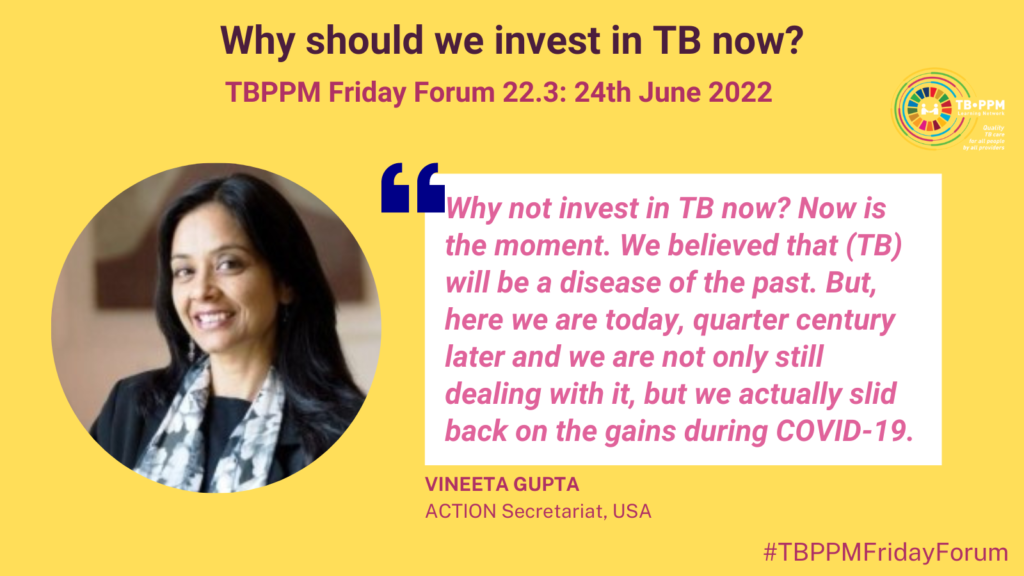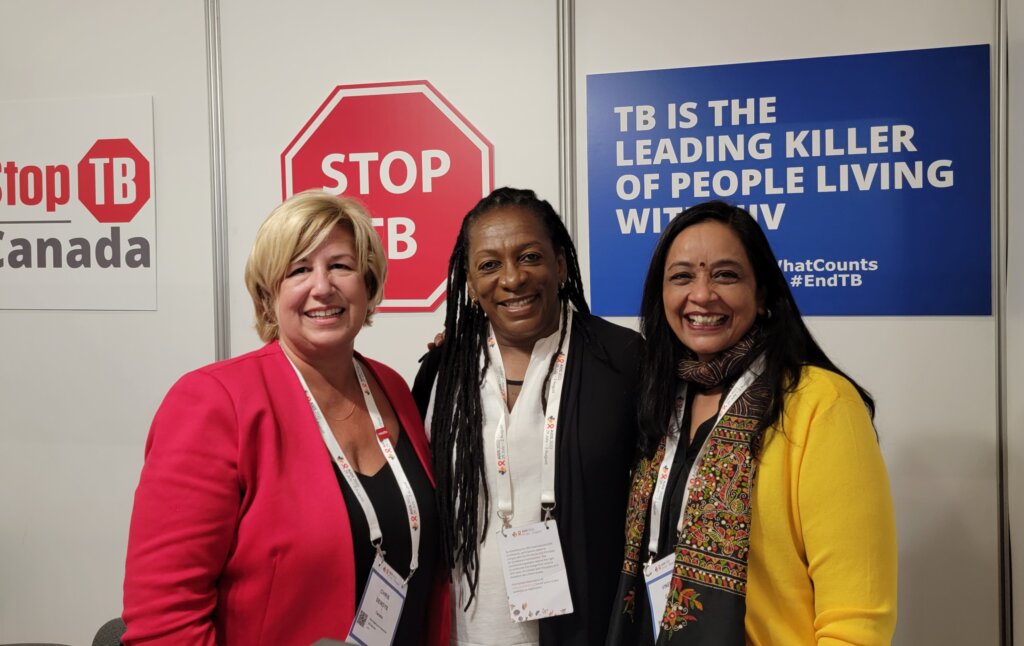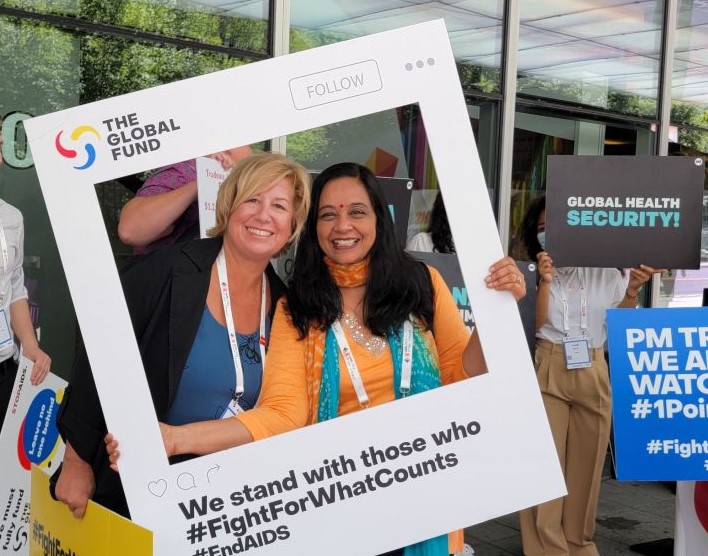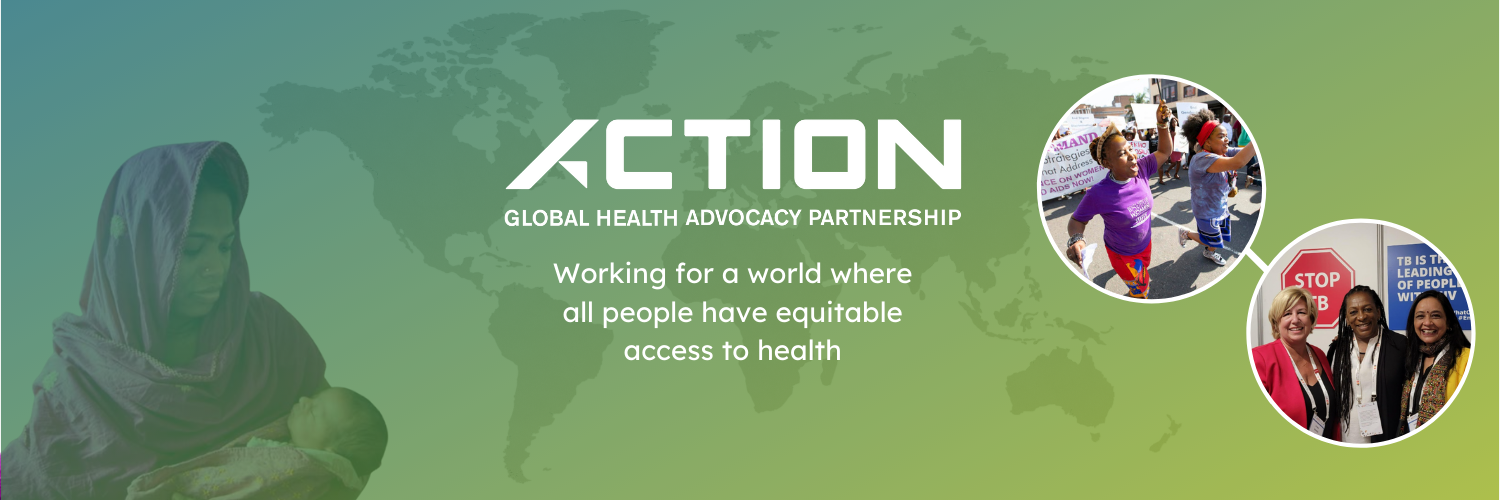A MESSAGE FROM THE DIRECTOR
Dear colleagues and co-conspirators,
It’s hard to believe we are already in September! It was a busy summer for ACTION partners as we continue to ramp up advocacy ahead of major key global health moments including the Global Fund 7th Replenishment, the launch of the World Bank FIF, the GFF replenishment, and UNGA.
Over the summer, partners coordinated with one another as well as external allies to advocate for a successful Global Fund replenishment to end preventable deadly diseases. I am proud of the many ways partners engaged including through media advocacy, meetings with MPs and policymakers, webinars, roundtables, sign-on letters, and earned media. The International AIDS Conference was a key opportunity for partners to engage allies and stakeholders. We are continuing this work full speed ahead as we are less than two weeks away from the September replenishment conference.
ACTION partners have been closely following the development of the new FIF housed at the World Bank and are advocating tirelessly for an improved governance model that is equitable and inclusive of civil society and low- and middle-income countries. During the G7, partners called for an end to the global food crisis and are now following up with decision makers to track N4G commitments to nutrition from last December.
In reflecting on some of my biggest takeaways from the AIDS Conference, I remain focused on advancing global health equity and see it as a prerequisite to achieving our global health goals, including ending TB. We must look critically at our systems that perpetuate inequity and work to change them so that everyone everywhere has affordable access to health care. The fight continues.
In solidarity,
Vineeta

Vineeta Gupta, MD, JD, LL.M
Director, ACTION Secretariat
Advocacy Updates:
Equitable and Sustainable Systems:
- The ACTION Partnership strategically coordinated feedback on the FIF White Paper in June and submitted a letter with recommendations to World Bank leadership to improve the FIF’s structure and governance model. GHA France shared with the EU Commission a letter with updated recommendations for a workshop on the design of the FIF. In addition, ACTION will be updating our recommendations in the coming weeks to submit to several stakeholders engaged in these conversations (unfortunately, many are being excluded from these closed-door meetings where a lot of the critical discussions are taking place on the FIF, including members civil society). Partners will continue to follow FIF developments closely and work to make civil society heard.
- In August, Results Canada hosted a hybrid virtual and in-person meeting with the CEO of Coalition for Epidemic Preparedness Innovations (CEPI), Richard Hatchett, in Ottawa. Dr. Hatchett’s trip came at a pivotal moment as the Access to COVID-19 Tools Accelerator (ACT-A) is sunsetting and the new FIF for Pandemic Preparedness, Prevention and Response takes shape. Dr. Hatchett shared information about CEPI’s role in responding to COVID-19 and in PPR. He briefed partners on what they need to know about ACT-A sunsetting and the new PPR FIF and sought input and support in securing an ambitious pledge from Canada in their $3.5 billion plan to turn the tide against epidemic and pandemic infectious diseases. This meeting allowed partners to gain some insights on pandemic preparedness and the critical role of CEPI and global health R&D within this space. It was also a moment for Results Canada and others to come together to align on Canada’s contribution to pandemic preparedness and global health security, particularly regarding the new FIF.
- In July, HDT supported and attended the annual RMNCAH planning meeting in Morogoro. At the beginning of the Government’s financial year, the Ministry of Health (MoH) together with partners convened an annual planning meeting to reflect on the previous year’s implementation and strategically plan for the new financial year. The meeting was attended by the MoH and other stakeholders aimed at ensuring the plans of the MoH are in line with other strategies such as the One Plan III (the investment case for GFF), the National Family Planning Costed Implementation Plan, and the Health Sector Strategic Plan V. The GFF informed part of the discussion, which is especially critical now that the World Bank has committed to continuing supporting Tanzania in improving maternal, newborn and child health. HDT was especially instrumental in helping to ensure the GFF’s priorities are included in the plan.
- In July, the ACTION Secretariat attended the Allies Improving PHC workshop, where members agreed on issuing a call to action on PHC ahead of the September UN General Assembly. During the workshop, there was a short brainstorming exercise aiming to gather Allies’ ideas on specific key tasks and means to emphasize the need to include PHC in global health policy discussions.
- In June, KANCO partnered with the media council of Kenya for the training of media outlets on how to uncover health challenges facing Kenyans, show emerging health needs, and catalyze political will for investing in research & development (R&D) to ensure medical technologies and products are accessible to all. The media has a critical role to play in sharing relevant and accurate information with policymakers and members of the general public. The media serves as one of the most critical public/social accountability mechanisms and will be the main source of information. The media need to be able to discuss issues related to Health R&D, with an understanding of how people are and may be affected by investment and regulation of Health R&D or lack thereof. There is a distinct opportunity as well for the media to act as a conduit to provide the public with information to view data and information critically and through a human rights lens. This activity will help to build the capacity of members of the public to comment, critique, and hold policymakers accountable for the attainment of UHC. The Expected Results: Editors and journalists have an improved understanding of health R&D and the work and mandate of CHReaD leading to increased health R&D coverage. The Media remains an important ally in improving domestic accountability by putting issues that directly concern the interests of citizens and public institutions on both public and political agendas.
- WACI Health finalized their GFF We Want Campaign Report and case studies in Senegal, Tanzania, and Zambia which capture some of the accomplishments and lessons learned and country-level recommendations. Check out all three case studies here. The campaign will now focus on implementation and accountability with the GFF We Want platform. In addition, Kenneth Prudencio from ASAPSU was appointed as Youth Representative Alternate on the GFF Investors Group and attended the GFF Investors Group Meeting in Marris last month. The GFF Investors Group put out a set of key decisions to ensure that the GFF takes forward the prioritization of strengthening primary health systems as a pillar of the GFF.
- In June, GHA EU held a meeting with the GFF secretariat to update them on the GFF fundraising strategy with the European Commission and to exchange ideas on advocacy campaigns and priorities over the next few months. Also in June, GHA France held a meeting with the GFF secretariat to follow up on the investment group meeting of the GFF that took place in France. The GFF secretariat met with French CSOs to explain the mechanism and share intel about their replenishment campaign. GHA was able to ask questions on resource mobilization, the impact of the GFF, and its leveraging effect on resource mobilization. The dialogue with France about a pledge to the GFF is well established, but budget constraints remain an obstacle to their engagement.
- From June-July, Results Japan followed up on IDA20 advocacy by hosting continuous meetings with World Bank representatives, the Vice-Minister of Finance for International Affairs, and the Minister of Finance. Thanks to Results Japan’s negotiation engagement, the Minister of Finance decided to include the delivery of IDA resources in the 2023 annual budget.
Ending the Epidemics:
ACTION partners engage around the Global Fund 7th Replenishment
- On August 28, the White House announced that President Biden will host the Global Fund’s Seventh Replenishment Conference on September 19 in New York City on the sidelines of the UN General Assembly. With the conference less than two weeks away, ACTION partners are engaging in final push campaigns and engaging MPs and leaders to make bold pledges to the Global Fund that reflect a 30% increase. Most recently, partners are celebrating the advocacy work of Results Japan after it was announced that Japan would make a US$1.08 billion commitment to help end the 3 diseases by 2030. Partners will continue to collect intel and several folks will be attending the conference in person in New York.
- GHA France published a video calling on France to increase its contribution to the Global Fund Replenishment.
- GHA coordinated a global action with several CSOs in Francophone Africa such as Impact Santé Afrique and ASAPSU. They sent a letter to the French Ambassador to Côte d’Ivoire to call on France to increase its contribution to the Global Fund. This letter was sent as part of a larger mobilization of French embassies in 15 African countries to mobilize the French diplomatic network prior to the Global Fund conference.
Healthy Start:
- The pledging event for the Global Polio Eradication Initiative (GPEI) is quickly coming up, scheduled for October 18 at the World Health Summit in Berlin. In support of a final push for strong financial pledges from the UK, Canada, and Australia, the Secretariat is working with partners to finalize a report that outlines the value of investing in GPEI and the eradication efforts, including a set of country case studies and accompanying recommendations for the target markets (UK, Canada, and Australia). We have received excellent feedback from external reviewers and the group is now revising a second draft.
- Results Canada has joined the Humanitarian Policy Advocacy working group on famine prevention and response (HPAG) and is supporting sector allies in G7 advocacy. With HPAG, Results Canada will be working on a collective pre-budget submission, making the case for increased investments in hunger and malnutrition, as well as organizing a “Walrus talk” on the Global Hunger Crisis to raise Canadians’ awareness about the issue.
- From 26 to 28 June, the leaders of the G7 countries convened in Schloss Elmau, Germany for the G7 Leaders Summit – a platform for discussing and determining urgent issues and shaping political responses. A group of advocates came together across Nutrition, Agriculture, Food systems and Climate to rally around a set of asks of the G7 countries. ACTION partners around the globe participated in the Twitter storm to demand that G7 leaders take action now to end hunger.
- Also during the G7, global nutrition advocates rallied for the G7 to take bold action to respond to the global hunger and nutrition crisis. The ACTION Secretariat, RESULTS UK, KANCO, and other partners have variously helped craft recommendations, signed onto statements, and attempted to bring attention in the media to the need for urgent action not just on hunger but on the effects of malnutrition. In their Statement on Global Food Security, G7 leaders pledged $4.5 billion to increase global food and nutrition security. While we’re glad to see the G7 include language about nutrition, the $4.5 billion needs further unpacking — overall the package is way too small to have an impact. ACTION is working with a group called Turbocharge G7 Nutrition Advocacy to craft a response calling on the G7 to double its pledge, begin disbursements of N4G pledges immediately, and rename the new “Global Alliance for Food Security” to the “Global Alliance for Food & Nutrition Security.” Additionally, the SUN CSN Secretariat has drafted a declaration statement about the global FS/nutrition crisis: “A global Food System at breaking point: the impact of international crises on access to nutrition.”
- In July, GHA EU launched a campaign on Twitter to highlight the mismatch between the EU’s pledge at N4G Summit and the state of nutrition in the EU programming. GHA has selected 4 countries suffering from malnutrition in which nutrition is absent from the EU programming: Burkina Faso, Côte d’Ivoire, Cameroun, Tanzania. In these countries, the government has highlighted nutrition as a national priority, and there are civil society networks dedicated to nutrition (eg. SUN Civil Society Network). The aim of the campaign was to call on the EC and the EU Delegations abroad to encourage them to invest more in nutrition.

International AIDS Conference 2022
Several representatives from Results Canada, Citam +, WACI Health, REF, and the Secretariat attended the AIDS International Conference which wrapped up in Montreal, Canada on August 2. The ACTION Secretariat hosted a welcome dinner for ACTION partners. Results Canada along with STOP TB Canada had a booth in the Global Village for the conference, where they invited participants to take a set of advocacy “actions” including some in support of their campaign to help secure a CAD$1.2 billion pledge from Canada for the Global Fund. While PM Trudeau did not make an appearance at the AIDS Conference, partners continue to work to leverage the mounting pressure to push for a strong Global Fund pledge. The conference overall was great and very energetic, with sessions like “What the HIV Movement Brings to Pandemic Prevention, Preparedness, and Response” and “Monkeypox: Outbreak and response in non-endemic countries” that spoke to the current situation unfolding right now. There was a powerful session on “Anti-racism and decolonizing the AIDS response: Moving from rhetoric to reformation” that caused a lot of discussions. In addition, many partners had the opportunity to touch base and meet with key players in the global health space. Vineeta had meetings with her contacts such as Soumya Swaminathan, Chief Scientist at WHO; Madhu Pai; Healy Thomson from Stephen Lewis Foundation who is collaborating with RESULTS Canada; Lola Walker, Global Lead, Adolescent HIV at UNICEF, and others. The Secretariat also had the chance to have strategic meetings with several collaborators including the Gates Foundation to discuss upcoming work in the fall. Overall, it was an enriching conference. See here for some highlights from the partnership’s online advocacy around the conference.

Resources and Blogs:
- Investing in women, children, and nutrition is not optional. The world’s future depends on it by Dr. Vineeta Gupta and Dr. Philippa Whitford MP
- TBPPM Friday Forum: Why should we invest in TB now? Featuring Dr. Vineeta Gupta
- Is the World Bank’s Proposed Fund an Answer for Future Pandemics? by Dr. Vineeta Gupta
- A new pandemic fund that could do more harm than good from RESULTS Educational Fund
- CEPI published a recent article Why the COVID-19 R&D job is not finished. The article highlights the need to continue investing in COVID vaccine R&D. It talks about optimizing current vaccines, as well as developing broadly protective vaccines against SARS-CoV-2 and thus adopting broad approaches to the whole coronavirus family.
- RESULTS UK’s new report, Health Crisis: The Global Fund’s Impact on Ukraine sets out the impact of the Global Fund in Ukraine and includes recommendations for international advocacy purposes.
- Youth Leader for Nutrition’s view on UK International Development Strategy from RESULTS UK
- WHO released a new report, “Role of the polio network in COVID-19 vaccine delivery and essential immunization: Lessons learned for successful transition,” documenting the contributions of the polio network to respond to the COVID-19 pandemic. A follow-up to a first report published in 2020, the focus of this report is the work undertaken by the polio workforce to deliver COVID-19 vaccines and essential immunization recovery in the context of the pandemic. It is intended to showcase the added value and the future potential of the polio network within the context of polio transition.
- GFF Case studies
- IDC Report: Racism in the Aid Sector from RESULTS UK.
- Community health workers are the key to expanding medical care

Events and Opportunities:
- September 13-27: 77th United Nations General Assembly
- September 19: Global Fund Replenishment Conference
- October 10-16: World Bank Annual Meetings. Registration is open!


